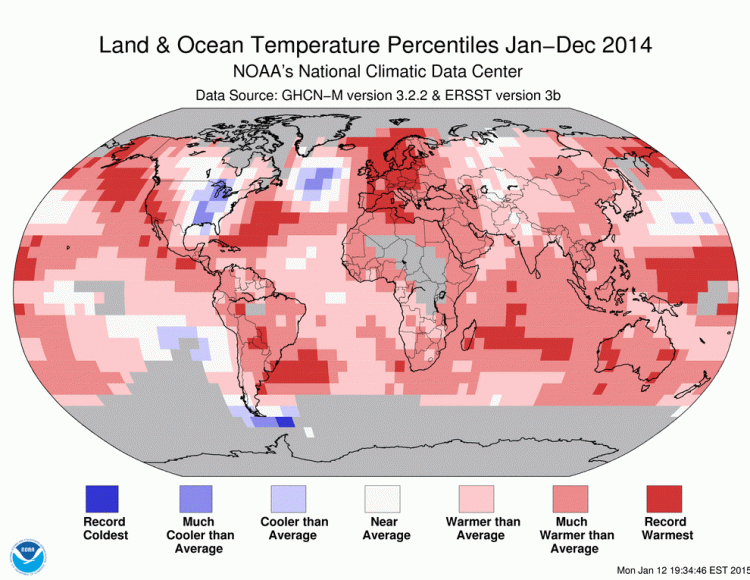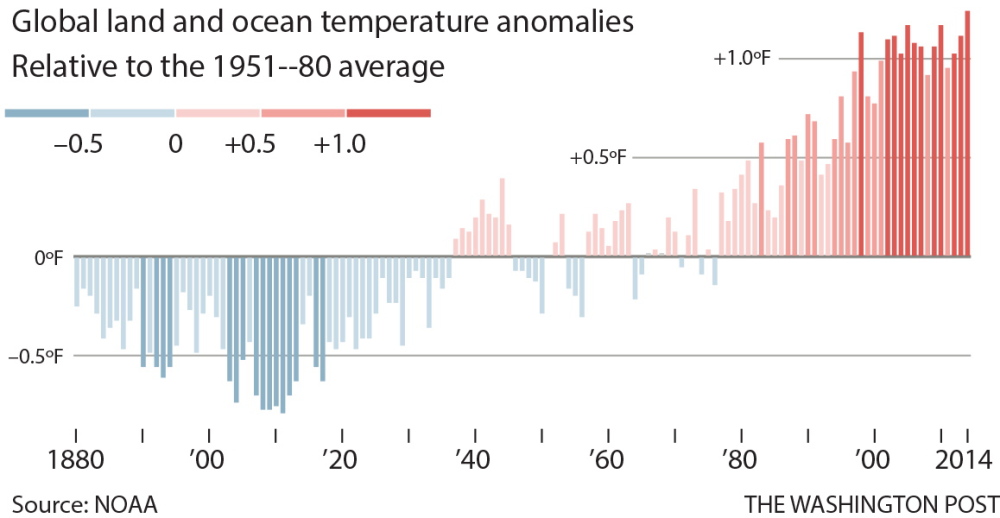Planet Earth set an ominous record last year as global temperatures rose to the highest level since modern measurements began, scientists said Friday in a report that heightened concerns about humanity’s growing toll on the natural systems that sustain life.
A joint announcement by NASA and the National Oceanic and Atmospheric Administration declared 2014 the hottest year based on separate analyses of weather records dating to 1880, when Rutherford B. Hayes occupied the White House.
Driven in part by steadily warming oceans, average temperatures edged past the previous records set in 2005 and 2010. The 10 hottest years in modern times all have come since 1997, NASA scientists said.
“This is the latest in a series of warm years, in a series of warm decades,” said Gavin Schmidt, director of NASA’s Goddard Institute for Space Studies in New York City. While fluctuations are possible in any given year in a system as chaotic as weather, Schmidt said, “the long-term trends are attributable to drivers of climate change that right now are dominated by human emissions of greenhouse gases.”
The grim milestone was recorded in a year in which large portions of the American West baked under epic droughts and heat waves, and glaciers and Arctic ice sheets continued a decades-long retreat. Historic droughts threatened drinking-water supplies across large swaths of Brazil and Australia, and thawing Arctic tundra opened up vast sinkholes in parts of Siberia and northern Canada.
U.S. WAS A RARE EXCEPTION
In one of the rare exceptions to the warming trend, the eastern United States was cooler than average in 2014, as an unusual dip in the jet stream sent waves of Arctic air plunging southward. Seven Midwestern states had an annual temperature among their 10 coolest on record. Maine, however, tallied its 28th-warmest annual temperature over a 120-year period.
While some Americans in the East were shivering, the rest of the world experienced record warmth in seven of 12 months in 2014 – including December – a NOAA analysis found.
Most surprising about the new record was the fact that it appeared in a year that did not witness an El Niño, the warm-weather pattern associated with unusually high ocean temperatures in the east-central Pacific, NOAA and NASA scientists said.
“This is the first year since 1997 that the record warmest year was not an El Niño year at the beginning of the year, because the last three have been,” Schmidt said.
The data reviewed by the U.S. agencies confirmed that much of 2014’s warming was driven by the oceans, the planet’s great repository of heat. Ocean temperatures were more than 1 degree above average, reaching the highest levels ever recorded, NOAA said. Land temperatures weren’t quite as record-setting, but still ranked fourth-warmest since the start of the data set in 1880. California, much of Europe, including the United Kingdom, and parts of Australia all experienced their warmest years.
Climate scientists said the streak of hot years was further evidence of human-induced warming caused by the buildup of greenhouse gases in the atmosphere. While the Earth’s climate has warmed and cooled throughout history, the recent warming correlates with sharply rising levels of heat-trapping carbon dioxide in the atmosphere from the burning of fossil fuels, scientists say.
“The temperature record is yet another brick in the massive wall of evidence that the climate is warming due to human activity,” said Simon Donner, associate professor of climatology at the University of British Columbia. “Of the 20 warmest years in recorded history, 19 happened in the past two decades. Our entire idea of ‘normal’ is changing.”
ONLY A SLIGHT ADVANCEMENT
The widely anticipated finding deflated – but did not fully dispel – a perception that the rate of warming has slowed since the 1990s. Several scientists noted that 2014 was not a blowout, statistically speaking. The year surpassed the next runners-up by only a few hundredths of a Centigrade degree, averaged across the globe. Some also noted that rising temperatures have not kept pace with computer simulations that predicted even faster warming, given the 40-percent rise in carbon dioxide levels in the atmosphere since the start of the industrial revolution.
“With 2014 essentially tied with 2005 and 2010 for hottest year, this implies that there has been essentially no trend in warming over the past decade,” said Judith Curry, professor in the School of Earth and Atmospheric Sciences at the Georgia Institute of Technology. “This ‘almost’ record year does not help the growing discrepancy between the climate model projections and the surface temperature observations.”
But other scientists said the spate of record-setting years should put to rest the notion of a global-warming “pause.”
“Viewed in context, the record 2014 temperatures underscore the undeniable fact that we are witnessing, before our eyes, the effects of human-caused climate change,” said Michael Mann, a professor of meteorology at Penn State University. “It is exceptionally unlikely that we would be seeing a record year – during a record warm decade, during a multidecadal period of warmth that appears to be unrivaled over at least the past millennium – if it were not for the rising levels of planet-warming gases produced by fossil fuel burning.”
The joint announcement by NOAA and NASA followed a careful, collaborative effort in which experts closely compared analyses. Last year, NASA and NOAA also worked together on an analysis of 2013, which ranks within the top-10 hottest years on record.
Send questions/comments to the editors.




Success. Please wait for the page to reload. If the page does not reload within 5 seconds, please refresh the page.
Enter your email and password to access comments.
Hi, to comment on stories you must . This profile is in addition to your subscription and website login.
Already have a commenting profile? .
Invalid username/password.
Please check your email to confirm and complete your registration.
Only subscribers are eligible to post comments. Please subscribe or login first for digital access. Here’s why.
Use the form below to reset your password. When you've submitted your account email, we will send an email with a reset code.